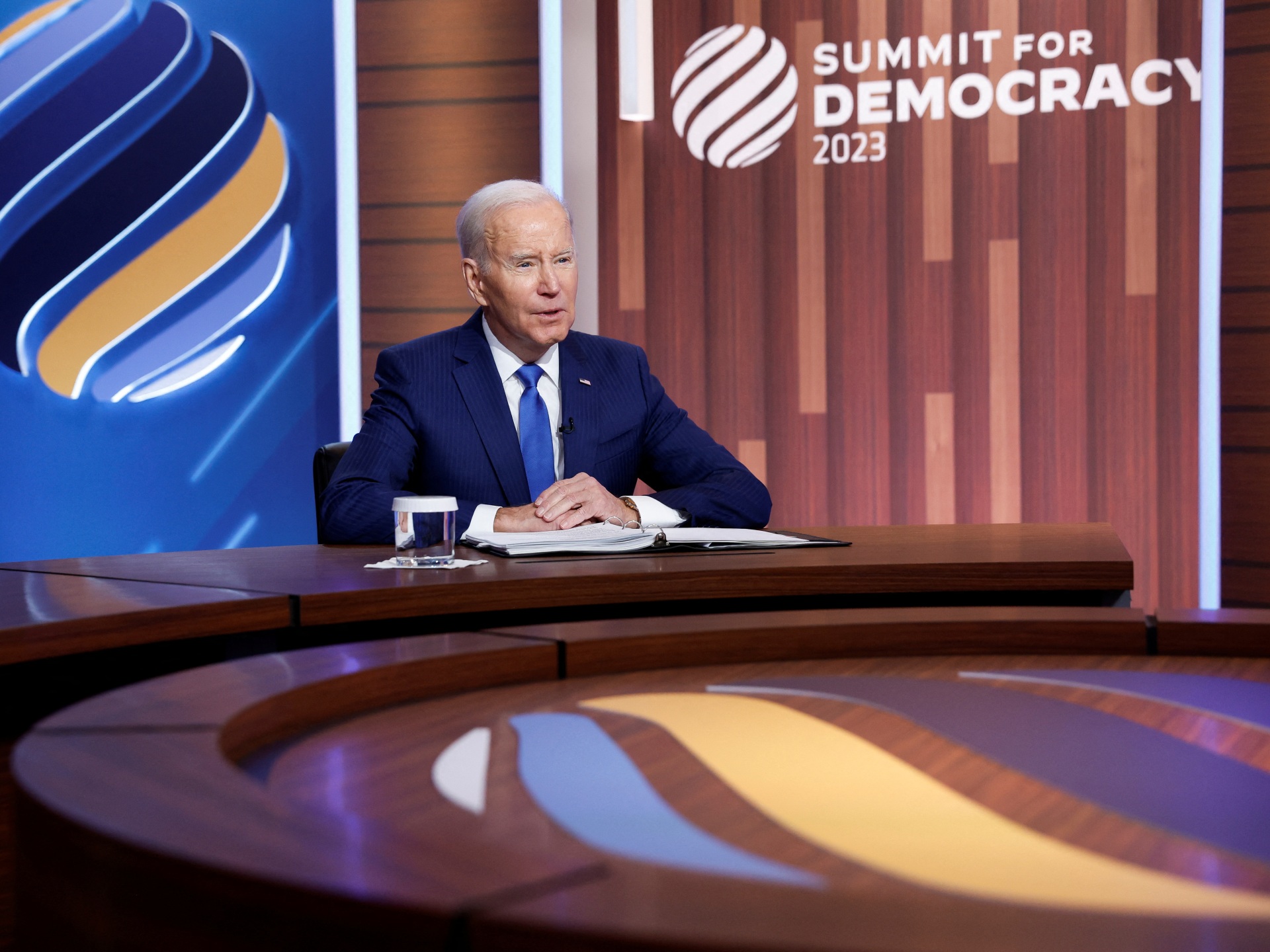United States President Joe Biden has kicked off his second Summit for Democracy by announcing $690m in new funding for democracy programmes across the world.
The summit, which started on Wednesday, comes amid rising concerns about democratic backsliding in countries participating in it, including US allies India and Israel.
Addressing other world leaders virtually, Biden said strengthening democracy is “the defining challenge of our age”.
“Today, we can say with pride that the democracies of the world are getting stronger, not weaker. Autocracies of the world are getting weaker, not stronger,” Biden said.
“That’s a direct result of all of us coming together with confidence in ourselves and conviction in our cause.”
Critics have questioned the usefulness of the summit, pointing to Washington’s own cozy relationship with authoritarian governments.
Early in his administration, Biden vowed to centre human rights in US foreign policy, but once in office, he continued his predecessor’s approach of prioritising perceived American interests, rather than proclaimed values, in international relations.
The summit consists of a series of in-person and virtual engagements, co-hosted by Costa Rica, the Netherlands, South Korea and Zambia.
The conference involves 120 countries, including Taiwan, but the Biden administration did not invite NATO allies Turkey and Hungary to the event.
“We’re committed to supporting democratic institutions, human rights, rule of law, [and] media freedom. So, decisions around whether to add countries to the summit invitation were made with all these themes in mind,” White House spokesperson John Kirby said on Wednesday.
Israeli Prime Minister Benjamin Netanyahu addressed the summit earlier in the day, despite recent US criticism about his plan to overhaul Israel’s judiciary – a move that critics say would weaken democratic rule in the country.
Moreover, major human rights organisations, including Amnesty International, have accused Israel of imposing a system of apartheid on Palestinians, millions of whom live in occupied territories under Israeli government control without basic civil rights.
Netanyahu said at the summit’s opening session that Israel remained a “robust democracy” in the midst of “a very intensive public debate”.
India’s Prime Minister Narendra Modi also addressed the event less than a week after leading opposition figure Rahul Gandhi was expelled from the country’s parliament.
Gandhi was stripped of his parliamentary seat on Friday, a day after he was convicted of defamation in Modi’s home state of Gujarat for a 2019 campaign trail remark seen as an insult to the prime minister.
My remarks at the ‘Summit For Democracy’. https://t.co/6EXuxlGyd6
— Narendra Modi (@narendramodi) March 29, 2023
A senior Biden administration official previewing the summit on Tuesday said the event aims to focus on themes of “strengthening democratic resilience, promoting respect for human rights, and advancing the fight against corruption”.
Biden said on Wednesday that one of his priorities will be to ensure that technology is used to advance, not undermine, democratic rule.
The US president highlighted a move by his administration last week to restrict the use of commercial spyware by government agencies.
“US taxpayer dollars should not support companies that are willing to sell their products to abate human rights violations,” he said.
In 2021, Washington imposed sanctions on the Israeli spyware manufacturer NSO Group, which has been at the forefront of global discussions of spyware abuse.
In his remarks on Wednesday, Biden also hailed what he called the “unprecedented unity” that democracies showed against Russia’s “brutal war of aggression against Ukraine“.
China, which has been the US’s top geopolitical competitor in recent years, criticised the event, calling on Washington to stop interfering in other countries’ “internal affairs” in the name of promoting democracy. Beijing, which is under one-party rule, was not invited to the event.
“Despite the many problems at home, the US is hosting another ‘Summit for Democracy’ in the name of promoting democracy, an event that blatantly draws an ideological line between countries and creates division in the world,” Chinese Foreign Ministry spokesperson Mao Ning told reporters on Tuesday.
“The act violates the spirit of democracy and further reveals the US’s pursuit of primacy behind the facade of democracy.”
On Wednesday, nine Democratic members of the US Congress sent a letter to Biden urging him to take the opportunity of the summit to announce support for establishing a new US institute to advance human rights in the country.
Many countries have such independent, public bodies that serve as watchdogs, advise policymakers and investigate alleged abuses.
In their letter to Biden, the lawmakers said a US human rights institute would “strengthen popular knowledge and understanding of human rights and help to further improve compliance with our human rights commitments and obligations”.
